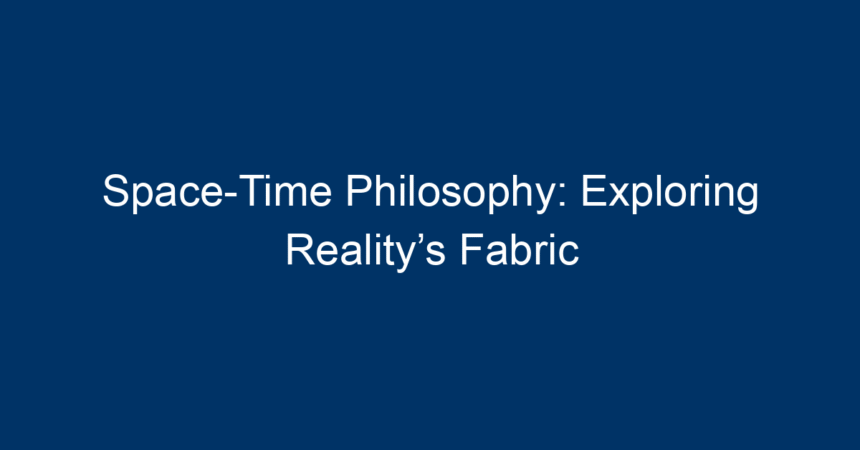In the quest to understand our universe, few concepts have intrigued humanity as much as the notion of space-time. Space-time philosophy delves into the intricate relationship between the dimensions of space and the flow of time, challenging our perceptions of reality and existence. This article will unravel the fundamental tenets of space-time philosophy, exploring its implications, its historical evolution, and its relevance in contemporary science and metaphysics.
What is Space-Time Philosophy?
Space-time philosophy is an interdisciplinary field that examines how space and time interact and influence our understanding of the universe. Rooted in physics, particularly in the theories established by luminaries such as Albert Einstein, space-time philosophy also intersects with metaphysics, providing a framework for discussing the nature of reality.
At its core, space-time philosophy posits that space and time are not separate entities but interwoven dimensions forming a four-dimensional continuum. This shift in perspective requires us to rethink traditional concepts such as motion, causality, and even existence itself.
Historical Context of Space-Time Philosophy
The Pre-Einstein Era
Before the advent of modern physics, thinkers like Isaac Newton viewed space as an absolute, linear arena where events occur independently of time. This traditional perspective laid the groundwork for a straightforward understanding of motion and change. However, as philosophers and scientists began to probe deeper into these ideas, limitations became evident.
Einstein’s Revolutionary Insights
With the publication of his theory of special relativity in 1905, Albert Einstein revolutionized our comprehension of space and time. He famously stated that time can slow down depending on the observer’s speed relative to the speed of light. This realization led to the introduction of the space-time continuum—a dynamic framework where the fabric of space is intrinsically linked to time.
Einstein’s general theory of relativity, presented in 1915, further deepened the philosophical inquiries surrounding space-time. It demonstrated how gravity can warp this fabric, affecting the perception of time for different observers. These groundbreaking theories invited a new wave of philosophical debates about the nature of reality and existence.
The Interplay of Space and Time
Dimensions of Reality
Understanding space-time philosophy requires grasping the idea that the universe consists of four dimensions. While we are familiar with the three spatial dimensions (length, width, and height), the fourth dimension—time—plays an equally critical role. Together, these dimensions create a "fabric" through which all events, past, present, and future, are woven.
The Illusion of Separateness
In space-time philosophy, the belief that space and time exist independently is considered an illusion. This perspective is supported by notable thought experiments, such as Einstein’s famous train paradox, where observers perceive the simultaneity of events differently based on their location and motion. This notion challenges our conventional understanding, urging us to consider a more interconnected view of reality.
Philosophical Implications of Space-Time
Causality and Free Will
One of the most significant ramifications of space-time philosophy is its influence on discussions of causality and free will. Traditional views postulate a linear cause-and-effect relationship rooted in time. However, within the context of space-time, causality becomes more complex. Events can occur simultaneously, yet their perception varies across different frames of reference. This leads to intriguing questions about whether free will exists or if our actions are predetermined by the structure of the universe.
The Nature of Existence
Space-time philosophy also redefines our understanding of existence. If space and time are intertwined, where does that leave our sense of "now"? The present moment emerges as a fleeting construct—an ephemeral slice of reality situated between the past and the future. This idea aligns with some Eastern philosophies that emphasize the transient nature of existence.
Contemporary Applications of Space-Time Philosophy
Scientific Developments
In modern physics, space-time philosophy continues to shape our understanding of the universe. Concepts such as black holes and the Big Bang challenge our perceptions of time and causality. For instance, black holes illustrate how the warping of space can lead to scenarios where time appears to stand still for an observer at the event horizon.
Cosmology and the Quest for a Theory of Everything
As scientists strive for a unified field theory—often referred to as a "theory of everything"—space-time philosophies play a crucial role. String theory and loop quantum gravity are two leading candidates that attempt to reconcile quantum mechanics with general relativity, suggesting a deeper fabric of reality that transcends our current understanding.
Artificial Intelligence and Space-Time
The implications of space-time philosophy extend beyond traditional science. In artificial intelligence (AI) and machine learning, understanding time-dependent data is crucial. Algorithms designed to analyze data over time often require frameworks informed by space-time philosophy, allowing for more nuanced interpretations of how events unfold.
Challenges and Critiques
Misinterpretations of Relativity
Despite its groundbreaking insights, space-time philosophy often faces challenges, particularly in the misinterpretation of Einsteinian concepts. Many proponents of this philosophy argue that some interpretations of relativity—especially deterministic views—oversimplify the complexity of time’s nature and its interaction with consciousness.
The Philosophical Debate
Philosophical discourse surrounding space-time is vibrant yet contentious. Dualists argue that space and time may have separate properties that cannot be fully reconciled within a single framework. In contrast, monists advocate for the interconnectedness of all aspects of existence, emphasizing the seamless relationship between space and time.
Actionable Insights: Engaging with Space-Time Philosophy
-
Explore Further: Engage with classic philosophical texts, such as those by Kant and Hegel, alongside contemporary works from physicists like Brian Greene and Carlo Rovelli. Their insights can deepen your understanding of space-time.
-
Reflect on Causality: Contemplate how the principles of space-time might influence your daily life. Consider scenarios where events seem simultaneous or causally linked, prompting deeper philosophical examination.
-
Connect with Communities: Join forums or online communities focused on philosophy and science. Engaging with others interested in space-time philosophy will broaden your perspective and inspire new ideas.
- Stay Updated: Follow developments in physics and philosophy. The landscape is ever-evolving, with new discoveries constantly challenging existing paradigms.
Conclusion
Space-time philosophy stands at the intersection of science and metaphysics, urging us to reconsider the fabric of our reality. By understanding how space and time interrelate, we gain insights not just into the universe, but also into our existence and consciousness. As our knowledge continues to expand, we encounter new questions and challenges that beckon us to engage with the profound mysteries of the cosmos. In exploring space-time philosophy, we embark on a journey that invites us to rethink not just what is possible, but what it means to be.




